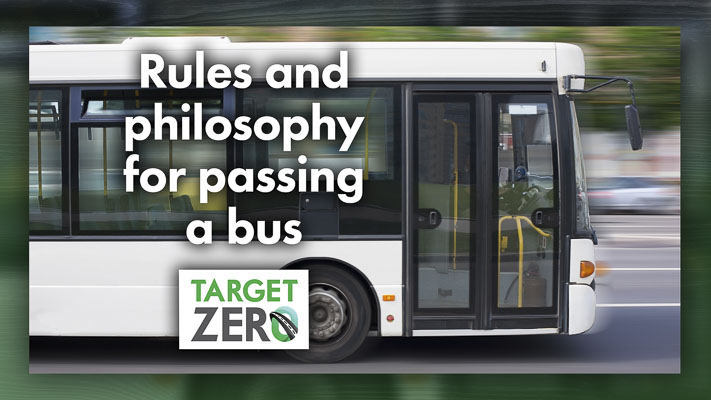
Target Zero Manager Doug Dahl addresses a question about passing a transit bus
Doug Dahl
Target Zero
Q: I was on a two-lane road, stopped behind a transit bus at a bus stop that was waiting for a passenger walking fast to catch the bus. A vehicle came up behind me, waited for about five seconds, then passed my car and the bus using the oncoming traffic lane. Were they in the wrong? In the right?
A: Leo Tolstoy once wrote, “It’s not given to people to judge what’s right or wrong. People have eternally been mistaken and will be mistaken, and in nothing more than in what they consider right and wrong.” With all respect to Leo, I’ll wager he’d have made an exception if he’d ever driven a car.

In Tolstoy’s defense, that quote was from a character in War and Peace (no, I haven’t read it all either), so it may not accurately represent his view. And even if your favorite philosopher claims that right and wrong is a made-up construct, when you’re driving a car, you’re subject to the made-up construct of the Revised Code of Washington.
Let’s use the law, and maybe a little philosophy, to determine if the person who passed you and the bus did the right thing. I’ll start with the obvious: Were there any signs or a solid center line indicating that it was a no-passing zone? Next: Is the oncoming lane “clearly visible and free of oncoming traffic” for enough distance to safely complete the pass? I’ll note that the law requires a driver to complete the pass and return to the correct lane before coming within 200 feet of any approaching traffic. And: Can you see a pedestrian or cyclist approaching in the opposite direction on the roadway, bike lane, or shoulder? This law might be a surprise for some folks. Yes, it’s true. You’re not allowed to move into the oncoming lane to pass a vehicle if there is a pedestrian or cyclist in view and passing the vehicle would put you at a distance unsafe to the walker or roller. Then: Is the driver able to pass the bus at a safe distance?
Assuming that all those requirements are met, there’s one more rule specific to transit buses. (And note that this is for transit buses; the law for passing school buses is stricter.) Drivers must yield to a transit vehicle when it signals and is reentering the traffic flow. That’s the big difference between passing a transit bus and a private vehicle; drivers of cars pulling into a lane of travel need to yield to vehicles already on the roadway, while drivers on the roadway need to yield to buses entering the traffic flow, and with good reason.
Most of us, when we drive, don’t frequently pull off to the side of the road and then reenter traffic. That’s a risky maneuver compared to cruising along in your lane, and it’s a required part of a bus driver’s job. Plus, it takes a much bigger gap in traffic to fit a merging bus than it does a car. Requiring drivers to yield to buses increases safety for the bus, but even more for the other driver. In a crash between a car and a bus, the bus is going to win.
If the driver who passed you and the bus followed all those rules, their pass was legal. As to whether it was right or wrong, who can understand the human heart? Instead, let’s imagine what Immanuel Kant might have said if he lived in the age of cars: We’ll never be perfect drivers, but we ought to work toward driving perfection.
TheWiseDrive is hosted by Doug Dahl, a Target Zero manager for the Washington Traffic Safety Commission.
Also read:
- POLL: Why did voters reject all three tax proposals in the April 22 special election?Clark County voters rejected all three tax measures on the April 22 special election ballot, prompting questions about trust, affordability, and communication.
- Opinion: The war on parental rightsNancy Churchill argues that Olympia lawmakers are undermining voter-approved parental rights by rewriting key legislation and silencing dissent.
- Opinion: An Earth Day Lesson – Last year’s biggest environmental victories came from free marketsTodd Myers argues that Earth Day should highlight free-market solutions and grassroots innovation as more effective tools for environmental stewardship than top-down mandates.
- Opinion: Time to limit emergency clauses and give voters a choiceTodd Myers urges the governor to remove emergency clauses from bills that appear intended to block voter input rather than address real emergencies.
- Letter: C-TRAN Board improper meeting conductCamas resident Rick Vermeers criticizes the C-TRAN Board for misusing parliamentary procedure during a controversial vote on light rail.










